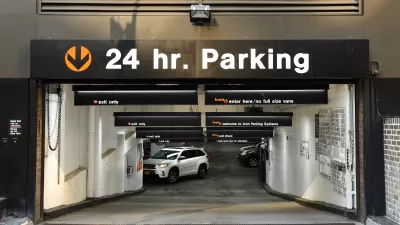Motor vehicles are costly, and every time somebody purchases a car they expect governments to provide roads and businesses to provide parking for its use. A new study totals these costs.

The car is one of the most expensive household consumer goods, yet there is a limited understanding of its private (internal) and social (external) cost per vehicle-km, year, or lifetime of driving. A new article, "The Lifetime Cost of Driving a Car" published in Ecological Economics, provides an overview of 23 private and ten social cost items, and assesses these for three popular car models in Germany for the year 2020.
The study's results confirm that motorists underestimate the full private costs of car ownership, while policymakers and planners underestimate the social costs. For the typical German travel distance of 15,000 car kilometers per year, the total lifetime cost of car ownership (50 years) ranges between €599,082 for an Opel Corsa to €956,798 for a Mercedes GLC. The share of this cost born by society is 41% (€4674 per year) for the Opel Corsa, and 29% (€5273 per year) for the Mercedes GLC. Findings suggest that for low-income groups, private car ownership can represent a cost equal to housing, consuming a large share of disposable income. This creates complexities in perceptions of transport costs, the economic viability of alternative transport modes, and the justification of taxes.
Carlton Reid's summary of this study in Forbes Magazine converts the cost values to American dollars: Lifetime Cost Of Small Car $689,000; Society Subsidizes This Ownership With $275,000.
FULL STORY: Lifetime Cost Of Small Car $689,000; Society Subsidizes This Ownership With $275,000

Planetizen Federal Action Tracker
A weekly monitor of how Trump’s orders and actions are impacting planners and planning in America.

San Francisco's School District Spent $105M To Build Affordable Housing for Teachers — And That's Just the Beginning
SFUSD joins a growing list of school districts using their land holdings to address housing affordability challenges faced by their own employees.

The Tiny, Adorable $7,000 Car Turning Japan Onto EVs
The single seat Mibot charges from a regular plug as quickly as an iPad, and is about half the price of an average EV.

Seattle's Plan for Adopting Driverless Cars
Equity, safety, accessibility and affordability are front of mind as the city prepares for robotaxis and other autonomous vehicles.

As Trump Phases Out FEMA, Is It Time to Flee the Floodplains?
With less federal funding available for disaster relief efforts, the need to relocate at-risk communities is more urgent than ever.

With Protected Lanes, 460% More People Commute by Bike
For those needing more ammo, more data proving what we already knew is here.
Urban Design for Planners 1: Software Tools
This six-course series explores essential urban design concepts using open source software and equips planners with the tools they need to participate fully in the urban design process.
Planning for Universal Design
Learn the tools for implementing Universal Design in planning regulations.
Smith Gee Studio
City of Charlotte
City of Camden Redevelopment Agency
City of Astoria
Transportation Research & Education Center (TREC) at Portland State University
US High Speed Rail Association
City of Camden Redevelopment Agency
Municipality of Princeton (NJ)





























